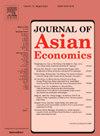非经济部门赛事的二氧化碳减排效应:来自全国文明城市评选的证据
IF 2.9
3区 经济学
Q1 ECONOMICS
引用次数: 0
摘要
高质量的经济发展需要考虑绿色低碳增长的环境和经济优势。与“GDP”推广赛不同,在非经济领域推广赛(nest)中,中央政府从多个角度选择城市。它评估官员在社会文明和环境管理方面的表现。全国文明城市评选(NCCS)通过竞争和认可来授予荣誉称号,提升获奖城市的品牌,避免过度关注经济效益导致的经济增长不平衡。本研究考察了NCCS作为NEST的一个关键例子,并使用多期差中差(DID)模型来探索NEST在减少二氧化碳(CO2)排放方面的有效性。结果表明,NCCS在提高经济效益和环境效益的同时,显著降低了CO2强度。机制分析表明,NCCS通过鼓励绿色生产、优化能源消耗和加强环境监管来实现这一目标。此外,NCCS改善了中标城市的社会福利。具有更多实质政治激励和更高公众环境素养的城市表现出更好的治理成果。此外,NEST框架在降低发展水平不同的大型非资源型城市和区域的二氧化碳强度方面特别有效。本文章由计算机程序翻译,如有差异,请以英文原文为准。
Carbon dioxide emission reduction effects of non-economic sector tournaments: Evidence from the national civilized city selection
High-quality economic development necessitates considering the environmental and economic advantages of green and low-carbon growth. Unlike “GDP” promotion tournaments, in non-economic sector tournaments (NESTs), the central government selects cities from various perspectives. It assesses officials’ performance in social civilization and environmental management. National Civilized City Selection (NCCS) awards honorary titles and enhances the brand of winning cities through competition and recognition, avoiding uneven economic growth caused by excessive attention to economic benefits. This study examines NCCS as a key example of NEST and uses a multi-period difference-in-differences (DID) model to explore how effective NESTs are at reducing carbon dioxide (CO2) emissions. Results show that NCCS significantly lowers CO2 intensity while promoting economic and environmental benefits. Mechanism analysis indicates that NCCS achieves this by encouraging greener production, optimizing energy consumption, and strengthening environmental regulations. Moreover, NCCS improves social welfare in winning cities. Cities with more substantial political incentives and higher public environmental literacy exhibit better governance outcomes. Additionally, the NEST framework is particularly effective in reducing CO2 intensity in large, non-resource-based cities and regions with varying development levels.
求助全文
通过发布文献求助,成功后即可免费获取论文全文。
去求助
来源期刊

Journal of Asian Economics
ECONOMICS-
CiteScore
4.70
自引率
9.40%
发文量
90
期刊介绍:
The Journal of Asian Economics provides a forum for publication of increasingly growing research in Asian economic studies and a unique forum for continental Asian economic studies with focus on (i) special studies in adaptive innovation paradigms in Asian economic regimes, (ii) studies relative to unique dimensions of Asian economic development paradigm, as they are investigated by researchers, (iii) comparative studies of development paradigms in other developing continents, Latin America and Africa, (iv) the emerging new pattern of comparative advantages between Asian countries and the United States and North America.
 求助内容:
求助内容: 应助结果提醒方式:
应助结果提醒方式:


